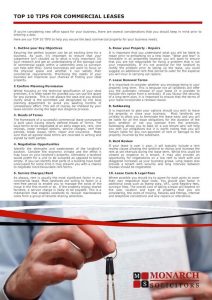If you’re considering new office space for your business, there are several considerations that you should keep in mind prior to entering a deal. Here are our TOP 10 TIPS to help you secure the best commercial property for your business needs.
1. Outline your Key Objectives
Securing the perfect location can be an exciting time for a business. As such, it’s important to ensure that your judgement isn’t clouded as to what is truly important. Do your research and get an understanding of the average cost of commercial space within a catchment area (a surveyor can help with this). Some businesses will want to focus on the physical space and whether it can satisfy their commercial requirements. Prioritising the needs of your business will maximise your chances of finding your ideal property.
2. Confirm Planning Permission
Whilst focusing on the technical specification of your ideal premises, it is often taken for granted you can use the space for any purpose. This is not always the case and you should clarify what is the permitted use designated by the local planning department to avoid you wasting months of unnecessary effort. This will of course, be checked by your lease solicitor during the legal due diligence process.
3. Heads of Terms
The framework of a successful commercial lease conveyance is built upon having clearly defined Heads of Terms. The keys terms to be negotiated at an early stage are, rent, rent reviews, lease renewal options, service charges, rent free periods, break clause, term, repair and insurance. Make sure that all agreed lease terms are recorded in writing and signed by both parties.
4. Negotiation Opportunities
Identify the strengths and weaknesses of the landlord’s position. Consider the economic climate and the effect it may have on your landlord’s property. Ultimately a landlord would prefer for a unit to be occupied as opposed to being empty. If you can identify that parts of a building have been unoccupied for some time it may present you with a chance to negotiate more favourable rent terms.
Download our Free Top 10 Tips For Commercial Leases
5. Service Charges/Rent
As always, rent is usually the most significant factor in any commercial lease. Most landlords are willing to factor in a rent-free period to enable you to manage the costs of the move in the first month or so. If the property enjoys shared facilities, a service charge is likely to be payable. This is a mechanism that enables landlords to recover maintenance costs from a group of tenants sharing amenities.
6. Know your Property – Repairs
It is important that you understand what you will be liable to repair prior to embarking on a new lease. “Wear and tear” is inevitable in all properties however you will want to ensure that you are not responsible for fixing a problem that is not your responsibility. If it’s not practical for the landlord to rectify the problem prior to taking up the lease, you could suggest an additional rent-free period to cater for the expense you will incur in carrying out repairs.
7. Lease Renewal Terms
It is important to consider whether you envisage being in your property long term. This is because not all landlords will offer you the automatic renewal of your lease (it is possible to exclude this option from a contract). If you favour the security of a long-term plan, it is important to ensure that the terms of your lease incorporate a renewal clause.
8. Subleasing
It is important to plan your options should you wish to leave the property or close your business. Most landlords are unlikely to allow you to terminate the lease early and you will be liable for all the lease obligations for the duration of the term whether or not you operate from the premises. Subleasing allows you to take on a sub tenant who will help you with our obligations but it is worth noting that you will remain liable for any non-payment of rent or damage to the property incurred by the subtenant.
9. Rent Review
If your lease is over 1 year, it will typically include a rent review clause allowing the landlord to review and increase the rent at set intervals during the lease term. Whilst this could be viewed as negative to a tenant, it may also provide an opportunity for negotiations on a low rent to start with and staggered increases as your business grows. Long leases also provide a tenant with security and long intervals between reviews should be negotiated.
10. Lease Costs & Legal Fees
Where possible you should try to agree for each party to cover their own respective legal costs. You should also factor in additional costs such as stamp duty, VAT, Land Registry fees, surveyor fees. The overall cost of taking a lease will depend on the size, location and type of property that you are considering, the costs of moving, fixtures and fittings, internet and telephone connections and any repairs or alterations.











